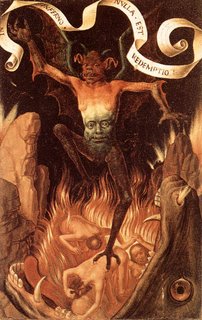Timendi causa est nescire.
Hell, Memling Hans, 1485.

Lucius Annaeus Seneca (often known simply as Seneca, or Seneca the Younger) (ca. 4 BC–AD 65) was a Roman philosopher, statesman, dramatist, and in one work humorist, of the Silver Age of Latin literature.
Works attributed to Seneca include a satire, a meteorological essay, philosophical essays, 124 letters dealing with moral issues, and nine tragedies. One of the tragedies attributed to him, Octavia, is clearly not by him. He even appears as a character in the play. His authorship of another, Hercules on Oeta, is doubtful. Seneca's brand of Stoic philosophy emphasized practical steps by which the reader might confront life's problems. In particular he considered it important to confront the fact of one's own mortality. The discussion of how to approach death dominates many of his letters.
Many scholars have thought, following the ideas of the nineteenth century German scholar Leo, that Seneca's tragedies were written for recitation only. Other scholars think that they were written for performance and that it is possible that actual performance had taken place in Seneca's life time. (George W.M. Harrison (ed.), Seneca in performance, London: Duckworth, 2000). Ultimately this issue is not capable of resolution on the basis of our existing knowledge.
The tragedies of Seneca have been successfully staged in modern times. The dating of the tragedies is highly problematic in the absence of any ancient references. A relative chronology has been suggested on metrical grounds but scholars remain divided. It is inconceivable that they were written in the same year. They are not based on Greek tragedies, they have a five act form and differ in many respects from extant Attic drama, and whilst the influence of Euripides on some these works is considerable, so is the influence of Vergil and Ovid.
Seneca's plays were widely read in medieval and Renaissance European universities so they strongly influenced tragic drama in that time, such as Elizabethan England (Shakespeare and other playwrights), France (Corneille and Racine) and the Netherlands (Joost van den Vondel) .

<< Accueil